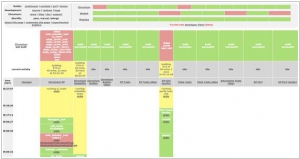Buildbot vs Jenkins
May 23, 2023 | Author: Michael Stromann
Buildbot and Jenkins are both popular continuous integration and continuous delivery (CI/CD) tools, but they have some key differences.
Buildbot is a highly customizable and extensible CI/CD framework written in Python. It offers a flexible and scalable architecture that allows users to configure and customize their build pipelines and workflows according to their specific requirements. Buildbot provides a wide range of features and supports various programming languages and version control systems. It is known for its reliability and stability, making it suitable for large-scale and complex projects. However, Buildbot has a steeper learning curve and requires more manual configuration compared to Jenkins.
Jenkins, on the other hand, is an open-source automation server written in Java. It provides a user-friendly web interface and a vast ecosystem of plugins, enabling users to easily set up and manage their CI/CD pipelines. Jenkins offers extensive integrations with popular tools and services, making it highly versatile and widely adopted. It has a large and active community, providing a wealth of resources and support. Jenkins is known for its ease of use and quick setup, making it suitable for both small and large projects. However, Jenkins can be resource-intensive, especially for complex and resource-heavy build processes.
See also: Top 10 Continuous Integration tools
Buildbot is a highly customizable and extensible CI/CD framework written in Python. It offers a flexible and scalable architecture that allows users to configure and customize their build pipelines and workflows according to their specific requirements. Buildbot provides a wide range of features and supports various programming languages and version control systems. It is known for its reliability and stability, making it suitable for large-scale and complex projects. However, Buildbot has a steeper learning curve and requires more manual configuration compared to Jenkins.
Jenkins, on the other hand, is an open-source automation server written in Java. It provides a user-friendly web interface and a vast ecosystem of plugins, enabling users to easily set up and manage their CI/CD pipelines. Jenkins offers extensive integrations with popular tools and services, making it highly versatile and widely adopted. It has a large and active community, providing a wealth of resources and support. Jenkins is known for its ease of use and quick setup, making it suitable for both small and large projects. However, Jenkins can be resource-intensive, especially for complex and resource-heavy build processes.
See also: Top 10 Continuous Integration tools




